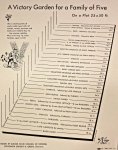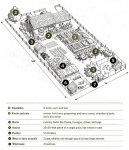I remember some foods from growing up, and some I still make. Especially dishes that used leftover meat from another meal. I think a lot of foods were created to use smaller amounts of meat and were probably created because of the depression. A filling meal with not much meat, like chicken ala king, tuna casserole, scalloped potatoes and ham.
I was raised by my parents but highly influenced by my grandmothers. Grandparents went through the depression and the war. Parents were born during the war years, but were too young to really remember it. But the way my parents were raised influenced how they raised their kids.
Both of my grandmothers were basically the leaders of their homes. Both of my grandfathers died when I was young - one from a heart attack and the other was a drunk who died during surgery. So both of my grandmothers were very independent, hardworking women who held jobs, brought in the bacon, and did everything needed for their families.
My parents were also hard working people. Even though we were "poorer" when I was really little, they had money when I was in junior and senior high school. In high school, my family would have been maybe middle or upper-middle class for the area. We lived in the country, but my parents worked in town. My dad worked at the iron mines in northern Minnesota for many years and was middle management for quite a few years before he died. My parents were poorer growing up, and as a result, they didn't want that kind of life for them and their kids when they had a family.
Here are some examples. I remember helping my paternal grandma doing clothes washing with an old wringer washing machine. We were taught to be very VERY careful around that! My dad made sure that our family had a good electric washer and dryer. Due to work and school schedules, hanging clothes on the line was a luxury for us, but I did it because I loved the smell of the clothes when they dried.
Both of my grandmas were always busy at home and made sure that we grandkids were kept busy. I know they had televisions, but I don't ever remember watching it at their houses. We were always too busy helping grandma. In contrast, my dad bought one of the first big color televisions in our area. It was in a big cabinet and had a record player in the other end of the cabinet. I remember lots of days and evenings watching television or dancing to music with my mom. Us kids had our chores, but not farm chores, so we had more time - after our homework was done - to watch TV. We all had our favorite shows, and us kids were allowed to watch cartoons until 9am on Saturday morning. Then the TV went off.
My parents weren't vain people, but my dad always said that he'd spend more to get better quality, and he always preferred new stuff over hand me downs or rummage sale. It was a fun treat to go to rummage sales with my grandma!
I don't remember eating many meals at either grandma's house, but when we did they were low on protein and heavy on potatoes and bread. As a result, my dad had a big freezer that he kept full of all kinds of meat, especially beef cuts. We had meat for almost every dinner. I was never big on meat (still am not), but I remember having school friends over and asking what they would like to have for the meal. I was a main cook for many meals in our house as my parents worked and I was the oldest child. So, since I made many of the meals, I got to choose what to make. But it had to have some kind of meat for my dad. My friends used to stand in awe of my dad's big upright freezer full of meat. To me, it was nothing special, just more work.
So, from my parents I learned to spend a little extra for the middle-of-the-road quality - not low quality and not high quality with all the bells and whistles. I learned how to buy in bulk and keep extra on hand as we bought from the local co-op store. I also learned from my dad that a person could learn how to fix a lot of things. My dad was the area jack-of-all-trades guy who was called to fix everything and anything, and he taught us kids a lot of his skills. And I learned from my mom how to clean the house and cook and bake at a very young age. I was in fourth grade when I was baking bread and desserts and making meals to help my mom as she worked and my parents were building another house. So that was partly for her benefit. When I was young, mom made many of our clothes during our poor years, so I also learned how to sew and make clothes.
From my grandmothers, I learned how to "reduce, reuse, recycle," and how to shop at rummage sales. I learned "use it up, wear it out, make it do, or do without" (which I did NOT learn from my parents as they'd throw away some good things and buy another one). I learned how to make do and how to make depression-type meals. From both parents and grandparents, I learned how to work hard and manage time to do everything that the family needed to have done.
Another thing I learned from both parents and grandparents - that family and friends were important and always welcome. Holidays were open and everyone was invited to come, visit and eat. Holidays and birthdays and any other special days were always filled with lots of family and friends, starting with my grandmothers and then my parents. That's the one thing I don't do and miss a lot. When my kids were little, we went to family gatherings, but we didn't have them as we lived too far away. When my parents got too old, gatherings just quit. My siblings were scattered and I lived too far from my cousins and aunts and uncles, so my kids had those gatherings when young but not since then. And now it doesn't seem like large gatherings are happening like they used to.
So, the depression years influenced my grandparents and parents in vastly different ways, but I guess I've learned to take the good points of both sides and incorporate them into my life. Works for me! (Sorry for the long posting...too many memories!)







